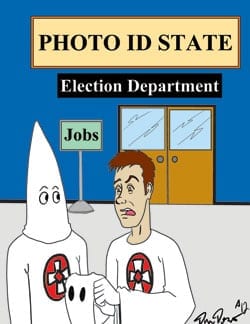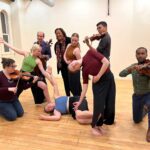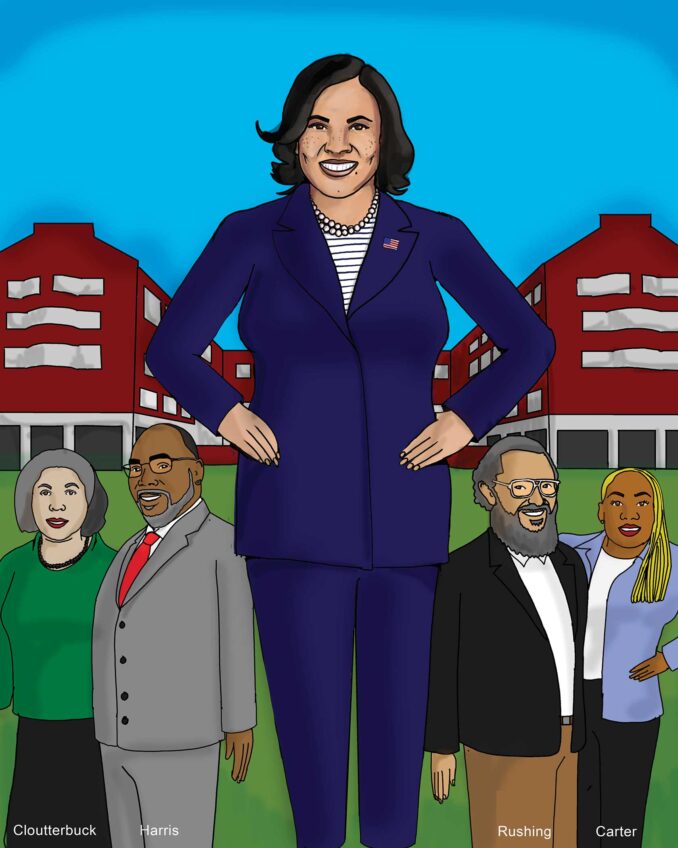
The long history of voter restrictions
| This is a peculiar uniform for a poll watcher. |
The one who gets the most votes wins. That is the essence of American democracy. But from the perspective of the financial oligarchs, the corollary is unacceptable — “to the victor goes the spoils.”
There are two sources of secular power in the United States: votes and wealth. The oligarchs have always understood that they will always be at a numeric disadvantage on the votes. Only 20 percent of the total population controls 50 percent of the nation’s wealth, and the oligarchs, though less than 10 percent of the total, control a disproportionate share.
From the time of the founding of the nation, universal suffrage was not part of the plan. Slaves and women were denied the right to vote, and men had to acquire a certain amount of property to be granted the franchise. It took the 15th Amendment to the U.S. Constitution to grant blacks the right to vote in 1870 and the 19th Amendment to grant women that right in 1920.
There is clearly an extensive history in this country of limiting universal franchise. The 10th Amendment empowered the states to enact procedures that might have the effect of restricting the vote. It states: “The powers not delegated to the United States by the Constitution, nor prohibited by it to the states, are reserved to the states respectively, or to the people.” As long as they do not impinge on the constitutional rights of citizens, the states have great leeway in establishing voting systems.
The customary voter registration system in the U.S. requires citizens to initiate the registration process. Personal responsibility is necessary if you want to be able to vote. One method to reduce registration of minorities and the poor was to have remote registration sites with limited hours.
The National Voter Registration Act of 1993 has diminished the effectiveness of those tactics. The law requires state offices that service citizens, such as the Registry of Motor Vehicles, to provide an opportunity to register to vote, and 14 states even allow online registration. Nonetheless, the system that imposes great responsibility on the individual has resulted in only about 68 percent of eligible voters being registered in the United States.
In other countries, government agencies have the responsibility to determine the voter list. For example, in Great Britain, an enumeration office contacts eligible voters directly and as a result 97 percent are registered. In Canada, Australia and France, various agencies provide information to election commissions and the registration rates are 93 and 91 percent, respectively.
It is no accident that the United States has adopted the least effective voter registration system. And it is not surprising that conservatives, the agents of the oligarchs, have asserted that the threat of voting fraud justifies an even more restrictive form of franchise eligibility — photo IDs.
There has upon occasion been voter fraud. Political bosses have stuffed ballot boxes or caused competing ballots to disappear. A massive campaign to send imposters to the polls is well nigh impossible to organize. There is little justification for imposing on the poor, the infirm and the elderly the burden of obtaining government-certified photo IDs. However, to do so is consistent with the historic inclination of the oligarchs to diminish their vote.
Massachusetts residents must assume the responsibility to register by Wednesday, Oct. 17 so that they can vote for president on Tuesday, Nov. 6.

![Banner [Virtual] Art Gallery](https://baystatebanner.com/wp-content/uploads/2024/04/NJ-H_1-150x150.jpg)




